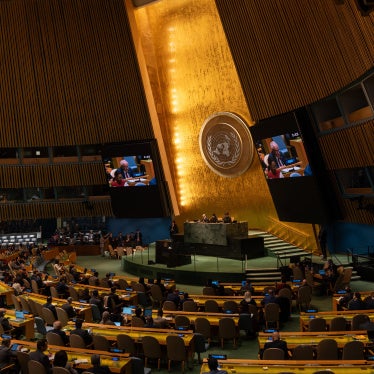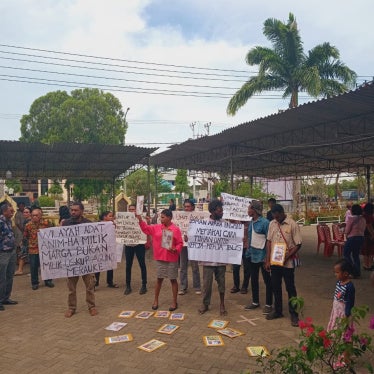The United Nations Commission on Human Rights convenes in Geneva on Monday, overshadowed by threats of war and terrorism, divided along regional lines, and chaired by Libya -- hardly a paragon of human-rights protection. This year, it faces a particularly challenging test: whether to hold China and North Korea accountable for their poor human rights records.
Depending on the actions of some key members, the Commission could increase its credibility by acting on the basis of human-rights principles, or allow geopolitical considerations to undermine its mandate. The 53-member body is unwieldy and has no enforcement power. Yet its voice still matters. Whether democracies or dictatorships, or countries "in transition," governments worldwide seek to avoid the commission's censure.
Even a closed, highly repressive government like the Democratic People's Republic of Korea (DPRK) wants to be seen as part of the U.N. human-rights system -- in form if not in substance. In 1981, North Korea ratified two core treaties, the International Covenant on Civil and Political Rights and the International Covenant on Economic, Social and Cultural Rights. More recently, Kim Jong Il's government filed detailed reports with the U.N. committees charged with monitoring compliance.
North Korea may have the worst human-rights record in Asia. But in 2001, Pyongyang told the U.N. that torture is prohibited by law, forced labor "is never used as a means of political coercion or social and religious punishment," and that North Korean criminal law strictly limits detentions and arrests. It maintained that under the DPRK constitution, basic freedoms of speech, press, assembly, association and religion are fully guaranteed.
Last year, North Korea submitted a second report describing legal protections of the right to work, the freedom of workers to "form and join a trade union of their choice," and the rights to health and education. The government said it is committed to "steadily improve the material and cultural life of people." While acknowledging the devastating effect of floods and typhoons in the 1990s on grain production, North Korea insisted that it puts a high priority on the right to adequate food for all of its citizens.
Despite the obvious credibility gap, by submitting these reports to the U.N., North Korea has officially affirmed its commitment to internationally recognized rights and standards, and is providing benchmarks that can be used to evaluate its actual performance. But getting access to North Korea to objectively investigate and monitor human rights conditions is a huge problem.
Defectors' stories and accounts by refugees open a narrow window on horrific conditions in North Korean labor camps and prisons, and other systematic abuses. Persuading North Korea to open itself up to visits by U.N. human rights experts, independent monitors and other international observers would be a real breakthrough.
No single diplomatic initiative can solve North Korea's human rights and humanitarian disaster. But it would be a useful first step to get a resolution on North Korea introduced and debated at the Commission critical of abuses and calling for unrestricted access by U.N. human rights experts.
The European Union has agreed in principle to take the lead, pending a signal from Seoul that it will not oppose such a resolution. South Korea has a seat on the commission. The newly elected administration of President Roh Moo Hyun -- a human-rights lawyer by training -- should see this as a constructive, multilateral way to address an extremely difficult issue, and an approach that is completely consistent with his "sunshine policy."
China, for its part, has responded to international criticism of its human-rights record by cooperating with the U.N. -- though reluctantly, and within certain limits. For more than a decade, Beijing has lobbied vigorously to keep any resolutions critical of China off the U.N.'s agenda. Only once, in 1995, was a resolution actually debated, and came within one vote of being adopted. That close call has increased China's determination to prevent any future U.N. action.
At the same time, the threat of censure has pushed Beijing to sign U.N. rights treaties, to release some political prisoners, and to invite U.N. human-rights experts to visit China to conduct investigations or educational seminars.
The UN's expert on torture, Theo van Boven, was recently invited by Beijing, though it's unclear whether he'll be given the cooperation necessary to do a credible investigation. And there's little hope of getting China to implement any of the U.N.'s recommendations for reform unless international pressure is sustained.
With Hu Jintao and a new leadership team coming to power, it is more crucial than ever for the international community to underscore the importance of human rights for China's continued economic and social development. The recent execution of former Tibetan monk Lobsang Dhondup, and the life sentence given to Chinese democracy activist Wang Bingzhang following secret trials, seem to indicate a hardening of official policy. Basic rights of free association and free expression remain under threat. Authorities continue to crack down on independent labor activists, and on users of the Internet who expose corruption or urge political reform.
Last year, no resolution on China was introduced in Geneva: the EU ducked the issue, and the U.S., previously a leading sponsor, didn't put forward a measure citing the fact that it didn't have a seat at the Commission. The EU's foreign ministers meet in Brussels on March 18-19 to make final decisions on the EU's priorities for the commission this year, and will wait until then to see what Washington decides to do about China.
According to the U.S. State Department, President George W. Bush will make the call. With the White House preoccupied with coaxing Beijing to cooperate at the U.N. on Iraq and with the U.S. on nuclear issues in North Korea, the outcome is unpredictable.
The U.S. may drop a China resolution all together, or introduce one only at the last minute in a token effort that China and other commission members can easily ignore. But to allow China to blackmail the U.S. into silence on human rights would be a huge mistake.
Can the U.N. Commission on Human Rights overcome its inherent weaknesses to address some of Asia's serious human-rights problems? Or will it inevitably be driven by geopolitical considerations that make a mockery of its role as the U.N.'s premier human-rights body? How key commission members deal with China and North Korea in the coming weeks will largely determine the outcome.
Mike Jendrzejczyk is Washington D.C. Director for Asia at Human Rights Watch.








